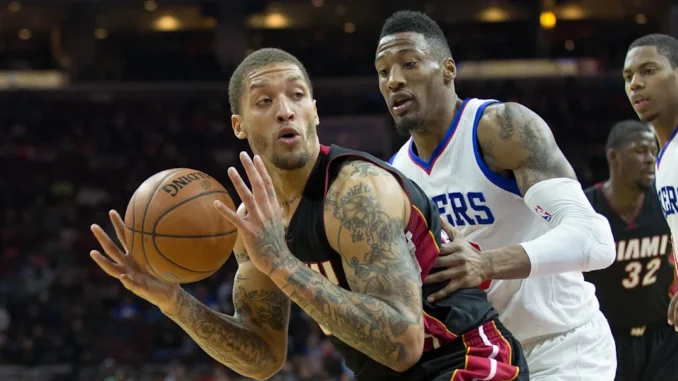
I Wasn’t Ready for Pat Riley”: Michael Beasley Comes Clean on Turbulent Heat Tenure
In the tumultuous world of professional sports, few careers have been as captivating and confounding as that of Michael Beasley. Drafted second overall by the Miami Heat in 2008, Beasley was a generational talent, a natural scorer with a seemingly limitless ceiling. But his tenure in Miami was anything but smooth. It was a chaotic mix of unrealized potential, off-court issues, and a clash of cultures that ultimately led to his departure.
Now, years after his last NBA game, the former Heat forward is coming clean. In a series of candid interviews, including a recent appearance on the “All the Smoke” podcast, Beasley is reflecting on his time in Miami with a newfound maturity and honesty. His reflections are not just a look back at a turbulent career; they are a cautionary tale about the perils of youth, money, and the immense pressure of living up to sky-high expectations.
The Clash of Cultures: Beasley vs. “Heat Culture”
The Miami Heat are an organization built on a foundation of discipline, hard work, and a relentless commitment to winning. This is the “Heat Culture,” a philosophy championed by team president Pat Riley and head coach Erik Spoelstra. Michael Beasley, a 19-year-old newly minted millionaire, was not ready for it.
“I wasn’t ready for f–ing Pat Riley, bro,” Beasley said. “And not in a bad way, like, man, Pat treated me like a son.” He went on to describe how Riley would make him sit in his office every week, a move Beasley resented at the time but now appreciates. “He made me sit in his office every f–ing week, whether I was listening or not. And I live by the morals he taught me.”
Beasley’s immaturity and a sense of entitlement, as he now admits, were the primary reasons for his struggles. He ignored Riley’s advice to buy a modest two-bedroom condo and instead bought a six-bedroom mansion. “I went the polar opposite, and my excuse to him was I grew up in an apartment and I needed some space,” Beasley said. The mansion, with its three dogs and four friends living in it, became a source of distraction and financial woes. Beasley’s off-court issues, including a well-documented marijuana incident, were a direct result of his inability to manage his new life.
Fighting Spo: The On-Court Struggles
While Beasley’s off-court issues were a major factor, his on-court struggles were just as significant. The biggest problem, as Beasley now admits, was his defense and a lack of attention to detail on that end of the court. This put him at odds with coach Erik Spoelstra, a coach who values defensive effort and discipline above all else.
In a recent interview, Beasley humorously referred to Spoelstra as the “toughest defender” he ever faced because the coach “never put me in the game.” While the comment was a joke, it also revealed a deeper truth about their relationship. Beasley’s inability to meet Spoelstra’s defensive standards led to a lack of trust, which came to a head in the 2010 first-round loss to the Boston Celtics. It was after that loss that Dwyane Wade said he needed more help, a plea that ultimately led to the arrival of LeBron James and Chris Bosh, and the departure of Beasley.
The “What If” Legacy and a Resurrected Image
Michael Beasley’s career will always be one of the great “what ifs” in NBA history. He had the talent to be a superstar, a player who could “lead the league in scoring,” as Doc Rivers once said. But his immaturity, his off-court issues, and his inability to buy into “Heat Culture” held him back.
However, in recent years, Beasley has undergone a personal and professional resurgence. He has become a dominant force in the Big3 3-on-3 league, and he is a reigning league MVP. He has also been praised by former teammates, including Dwyane Wade, who called him “the most talented player” not in the NBA. Beasley’s newfound perspective and his willingness to take responsibility for his past mistakes have helped to resurrect his public image.
His story is a reminder that talent is only one part of the equation. In the end, it was not his shooting or his rebounding that held him back; it was his lack of maturity and his inability to find a balance between his talent and the demanding culture of the NBA.
Leave a Reply